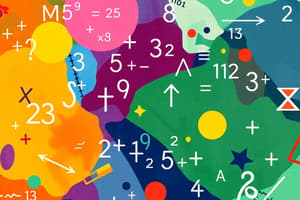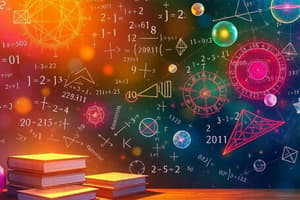Podcast
Questions and Answers
Which branch of mathematics primarily deals with manipulating symbols and variables to solve equations?
Which branch of mathematics primarily deals with manipulating symbols and variables to solve equations?
- Algebra (correct)
- Arithmetic
- Geometry
- Calculus
Which mathematical concept is NOT a fundamental building block of arithmetic?
Which mathematical concept is NOT a fundamental building block of arithmetic?
- Prime Numbers
- Variables (correct)
- Place Value
- Factors
Which branch of mathematics is concerned with rates of change and accumulation of quantities?
Which branch of mathematics is concerned with rates of change and accumulation of quantities?
- Geometry
- Algebra
- Calculus (correct)
- Probability and Statistics
Which statement BEST describes the relationship between mathematics and other sciences?
Which statement BEST describes the relationship between mathematics and other sciences?
Which statement CORRECTLY defines the concept of a function in mathematics?
Which statement CORRECTLY defines the concept of a function in mathematics?
Which of these is NOT considered a branch of mathematics according to the provided text?
Which of these is NOT considered a branch of mathematics according to the provided text?
Which two branches of mathematics are primarily concerned with analyzing data and uncertainty?
Which two branches of mathematics are primarily concerned with analyzing data and uncertainty?
Which statement BEST illustrates the concept of continuous change as studied in calculus?
Which statement BEST illustrates the concept of continuous change as studied in calculus?
Which branch of mathematics is MOST directly associated with the study of shapes, sizes, and positions of objects in space?
Which branch of mathematics is MOST directly associated with the study of shapes, sizes, and positions of objects in space?
Which of these is NOT a fundamental concept in Euclidean Geometry?
Which of these is NOT a fundamental concept in Euclidean Geometry?
Flashcards
Mathematics
Mathematics
A broad field including arithmetic, algebra, and more, studying numbers and shapes.
Arithmetic
Arithmetic
The branch of mathematics involving basic operations: addition, subtraction, multiplication, and division.
Algebra
Algebra
A branch focusing on symbols and variables to represent unknowns and solve equations.
Geometry
Geometry
Signup and view all the flashcards
Calculus
Calculus
Signup and view all the flashcards
Differential Calculus
Differential Calculus
Signup and view all the flashcards
Integral Calculus
Integral Calculus
Signup and view all the flashcards
Probability
Probability
Signup and view all the flashcards
Statistics
Statistics
Signup and view all the flashcards
Number Theory
Number Theory
Signup and view all the flashcards
Study Notes
Introduction to Mathematics
- Mathematics is a broad field covering various branches, including arithmetic, algebra, geometry, calculus, and more.
- It deals with abstract concepts like numbers, shapes, and structures, aiming to understand patterns and relationships.
- Mathematical principles are crucial to scientific fields like physics, engineering, and computer science.
- Mathematics serves as a language for complex ideas, expressed through symbols and equations.
Arithmetic
- Arithmetic focuses on basic number operations: addition, subtraction, multiplication, and division.
- It's a foundational element for higher math.
- Concepts include place value, prime numbers, and factors.
- Different number systems are covered, including natural numbers, integers, rational numbers, irrational numbers, and real numbers.
Algebra
- Algebra uses symbols and variables to represent unknowns and solve equations.
- It provides general methods for various mathematical problems.
- Topics include linear equations, quadratic equations, inequalities, and systems of equations.
- Concepts involve variables, expressions, equations, and functions.
Geometry
- Geometry examines shapes, sizes, and spatial positions of objects.
- It covers various shapes like triangles, rectangles, circles, and complex polygons.
- Geometry investigates concepts such as angles, lines, areas, volumes, and transformations.
- Different branches like Euclidean and non-Euclidean geometry exist.
Calculus
- Calculus studies continuous change, focusing on rates of change and accumulation.
- It includes limits, derivatives, and integrals.
- Calculus provides powerful tools for physics, engineering, and other fields.
- Key to modeling dynamic systems. Differential calculus (instantaneous rates of change) and integral calculus (accumulated quantities) are two main branches.
- Functions in multiple variables are frequently used in calculus.
Other Branches of Mathematics
- Probability and statistics deal with uncertainty and data analysis.
- Discrete mathematics focuses on countable objects and structures.
- Logic and set theory provide fundamental concepts for mathematical reasoning.
- Number theory analyzes the properties of numbers.
Applications of Mathematics
- Mathematics is essential across many fields, including science, engineering, finance, and economics.
- Mathematical models solve real-world problems, make predictions, and design new technologies.
- It's crucial for understanding and modeling phenomena in nature and society.
Mathematical Problem Solving
- Problem-solving is central to mathematics.
- Steps often include: identifying the problem, gathering relevant information, devising a solution strategy, implementing the strategy, and evaluating results.
- Mathematical problems can be approached analytically, graphically, numerically, or experimentally.
Studying That Suits You
Use AI to generate personalized quizzes and flashcards to suit your learning preferences.




